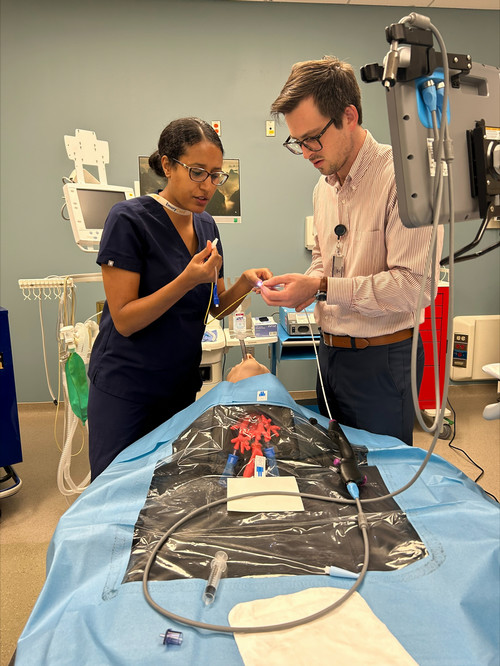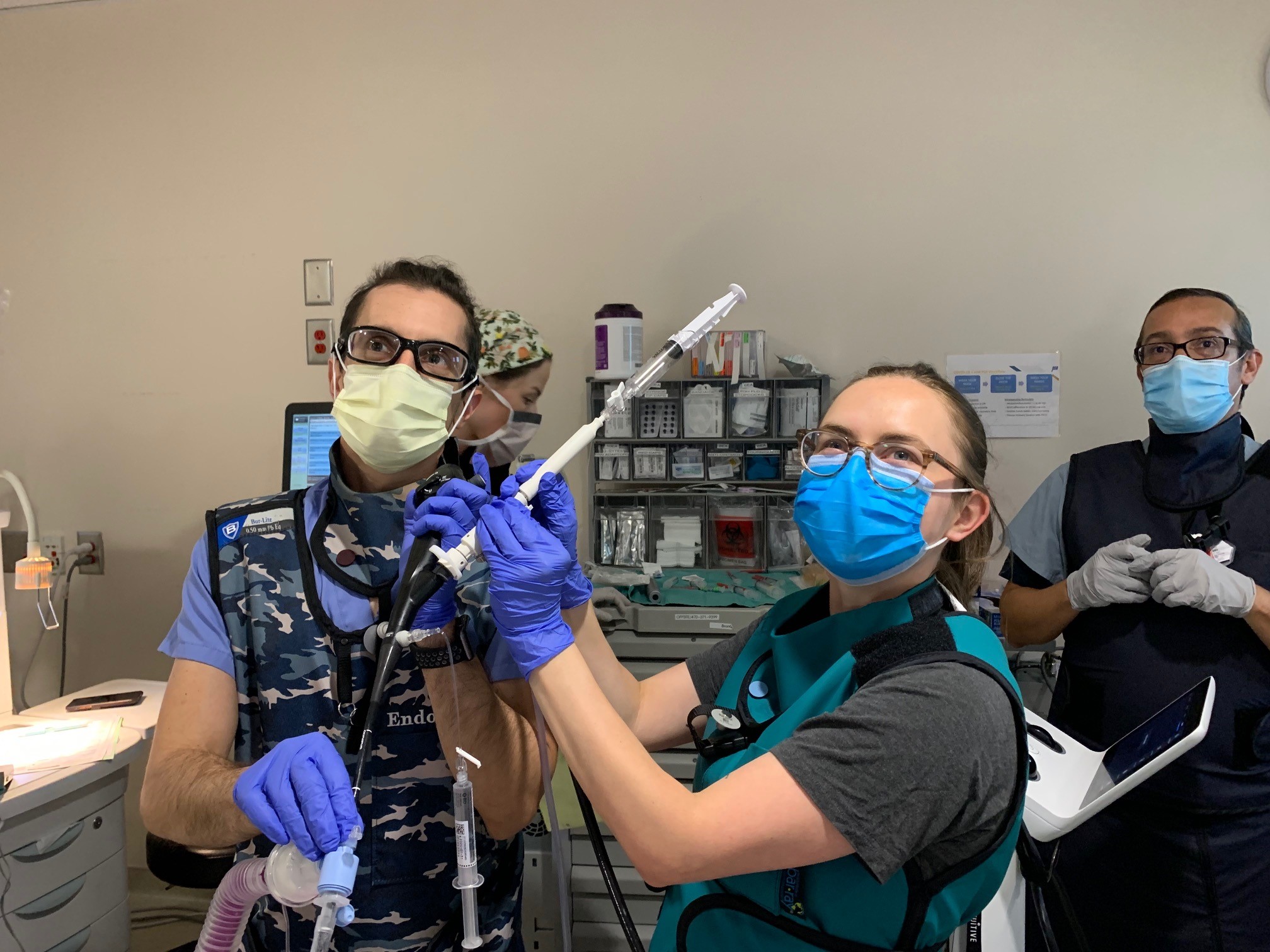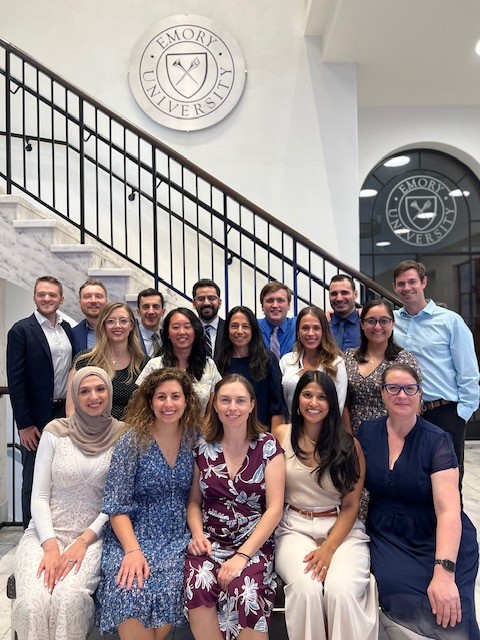Program Overview
We pride ourselves in a fellowship that is personalized to meet each fellow’s career goals. We do this by customizing the second and third year of fellowship to include experiences to help each fellow achieve excellence in their chosen career path, regardless of whether it is a clinical or research path.
Our fellowship has access to a wide variety of campuses allowing fellows to experience clinical practice in many settings such as a tertiary regional referral center (Emory University Hospital), a large county hospital (Grady Memorial Hospital), a Veterans Affairs Hospital, and affiliated hospitals with a semi-private practice model. Fellows graduating from our program are well-prepared to practice in any setting they may choose. The program is home to a wide range of faculty with expertise in various subspecialties (e.g. pulmonary hypertension, lung transplant, cystic fibrosis, interstitial lung diseases, interventional pulmonology, critical care, sleep medicine, basic science research, clinical research, and education) and who can serve as mentors to our trainees.

The First Year
The first year of training is a very rigorous clinical year, consisting of five months of critical care rotations, three months of inpatient consultation rotations and three months of outpatient experiences. Rotations during this year include:
- Medical Intensive Care Unit at Grady Memorial Hospital
- The Grady MICU experience has fellows working with teams of students, interns and residents in managing critically-ill patients. Two fellows rotate in this unit at any one time, and alternate covering 2 weeks of nights and 2 weeks of days. The night fellow enjoys the autonomy to lead a dedicated night team of residents and interns, independently leading rounds, and making management decisions.
- Medical Intensive Care Unit at the Veterans Administration Medical Center
- Fellows in the VA MICU supervise four medical residents in the care of critically-ill patients.
- Medical Intensive Care Unit at Emory University Hospital
- The MICU at EUH offers a unique patient population within our system; many patients admitted to this service have undergone solid-organ or bone marrow transplants, while others are admitted from our advanced lung disease service with interstitial lung disease, pulmonary hypertension or cystic fibrosis.
- Medical Intensive Care Unit at Emory St. Joseph's Hospital
- This service offers the unique opportunity to work one-on-one with a teaching attending managing a team of advanced practice providers, but without residents. This model of care is very commonly used outside of academic medicine and provides our trainees a perspective on this increasingly prevalent model of care. This service also covers the "code met" experience, which leads to a robust intubation experience during the rotation.
- Outpatient Pulmonary rotation at Emory Clinics
- During this 2-week rotation, fellows will work with our faculty in both general pulmonary and dedicated sub-subspecialty outpatient clinics, including focuses on asthma, allergy, interventional pulmonary, sleep, interstitial lung diseases, cystic fibrosis, pulmonary hypertension and lung transplant.
- Outpatient Pulmonary Rotation at the Veterans Administration Medical Center
- On this rotation, fellows work with a faculty member to evaluate outpatient pulmonary diseases, ranging from urgent consultations to routine follow-ups, including the work-up of abnormal lung imaging, lung masses, nodules, interstitial lung diseases and others. Fellows also rotate through our outpatient pulmonary function laboratory during this rotation, which includes experience in performing cardiopulmonary exercise tests.
- Pulmonary inpatient consultation and procedures at the Veterans Administration Medical Center
- This is one of the busiests procedural rotation in our system. Fellows on this rotation participate in pulmonary inpatient consults and perform all associated procedures. They also perform all routinely scheduled outpatient procedures (generally bronchoscopy, including endobronchial ultrasound-guided procedures and thoracenteses).
- Pulmonary consultation service at Emory
- This rotation gives fellows experience supervising a service of inpatients with complex pulmonary diseases (cystic fibrosis, interstitial lung disease, pulmonary hypertension and lung transplant). As time allows, rotating fellows also participate in affiliated clinics managing outpatients with these disease states.
- Pulmonary consultation at Grady Memorial Hospital
- This month-long rotation allows fellows to gain experience in providing inpatient consultation of patients with pulmonary disease. This is a busy procedural experience as well, as many of these patients require diagnostic bronchoscopy or thoracentesis during their evaluation.
- Pulmonary consultation at Emory St. Joseph's Hospital
- This experience is a procedurally busy service where the fellow works one-on-one with a Division faculty member. This service also covers the "code met" experience, which leads to a robust intubation experience during the rotation.
- Anesthesia
- First-year fellows will spend two weeks with faculty in the Department of Anesthesia to get a better grasp of basic and advanced airway management.
- Radiology
- First-year fellows will spend two weeks with our outstanding thoracic radiologists to gain experience in the interpretation of chest radiographs and CT scans.
- Sleep medicine
- Fellows will have a two-week experience in the sleep medicine clinic. This will predominantly consist of outpatient clinic, but there will be some experience with interpretation of home sleep apnea tests, polysomnograms, and CPAP adherence downloads.
Continuity Clinics
Beginning in our first year, and continuing throughout the three-year program, fellows will attend their own bi-weekly continuity clinics at Grady Memorial Hospital and the Veterans Administration Medical Center. For fellows interested in subspecializing within pulmonary medicine, additional (elective) continuity clinics in pulmonary hypertension, interstitial lung disease, cystic fibrosis, sleep medicine, and transplant are available.

Second and Third Years
One of the unique aspects of the Emory Pulmonary and Critical Care Medicine Fellowship Program is our individualization of the second- and/or third-year experience for each trainee. Midway through the first year of training in our program, fellows participate in the Career Development Course. This course offers trainees dedicated mentoring time with many of our faculty, including those with successful research careers, the most experienced clinicians in the sub-subspecialties of pulmonary medicine, and the senior educators in the Division. These meetings allow our fellows to meet all of our potential mentors, and to get a better sense of the different pathways to success in our specialty.
During follow-up meetings over the next several months, first-year fellows work with faculty leaders to develop specific, targeted career goals. We then design an individualized second- and third-year schedule to best achieve those goals. While each fellow will have a unique schedule, the general templates fall into one of two major categories, the Clinical Educator pathway or the Physician-Scientist pathway.
Application Information
Learn more about program eligibility, required application items, and interview arrangements.
Program Pathways
During their Pulmonary and Critical Care clinical experience, fellows are expected to develop and refine skills essential for the practice of Pulmonary and Critical Care Medicine including performing bronchoscopies, intubations, and performing and supervising other pulmonary procedures such as ventilator management, thoracentesis, chest tubes, central lines, pulmonary artery catheters, critical care ultrasonography, arterial lines, and learning to interpret pulmonary function tests. Elective time for additional dedicated training in lung transplantation, fibrotic and interstitial lung diseases, asthma, cystic fibrosis, pulmonary vascular diseases, interventional pulmonary, and sleep disorders medicine is available based on the career goals and prior experience of the trainee.
Mentorship and Career Development
By the conclusion of the first year of training, each fellow selects a primary mentor from among our 90 faculty members. This mentor, along with a secondary mentor selected by the division's Career Development Committee (CDC), works with the fellow to maintain the trajectory necessary to achieve the goals desired by the trainee. Note that the primary mentor does not need to be the person with whom the fellow plans to do research or work clinically (though this is preferable). The most important aspects of identifying a primary mentor are the personal relationship with the mentee and a track record of success with prior fellows.
In addition to regular meetings with their primary mentor, senior fellows deliver fifteen-minute semiannual "work-in-progress" presentations to the CDC, which will provide constructive feedback and ideas for potential new directions for the fellow's training and career path.


